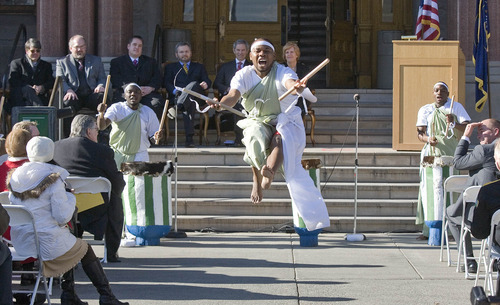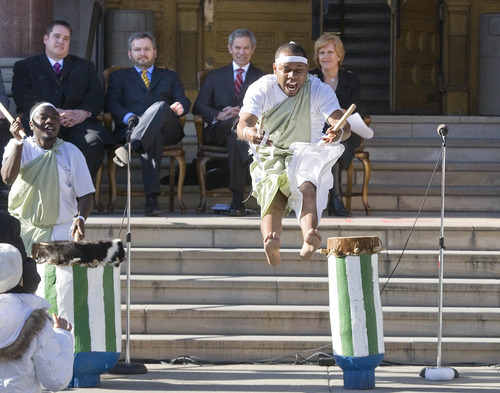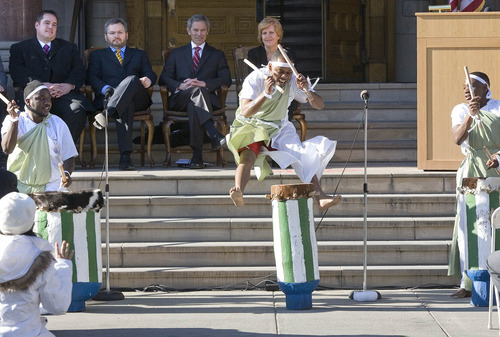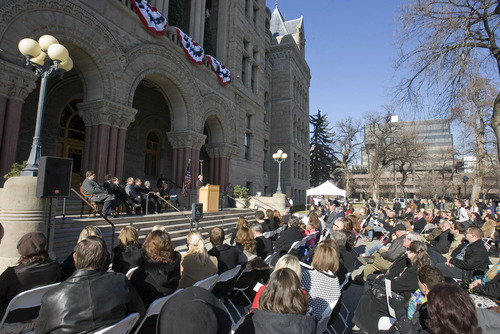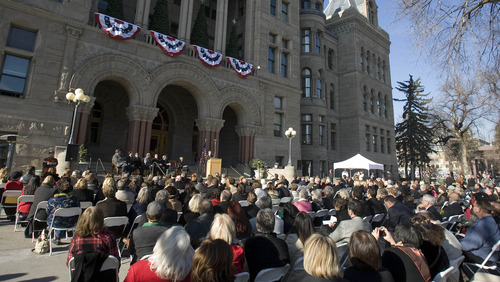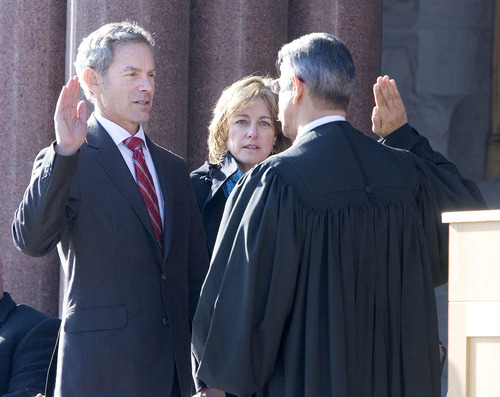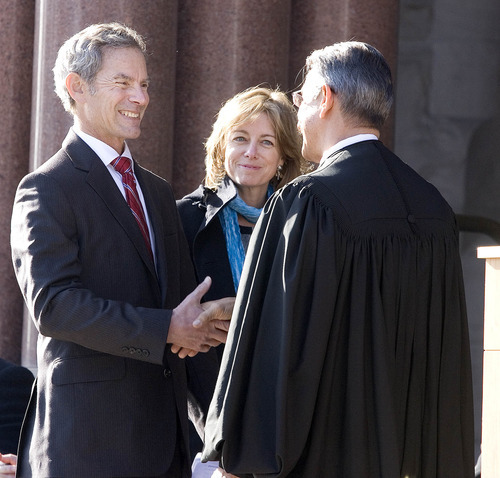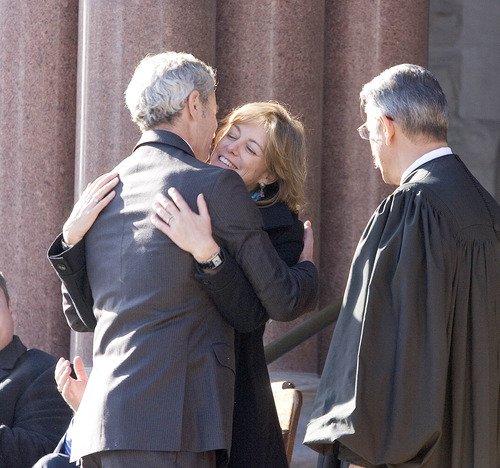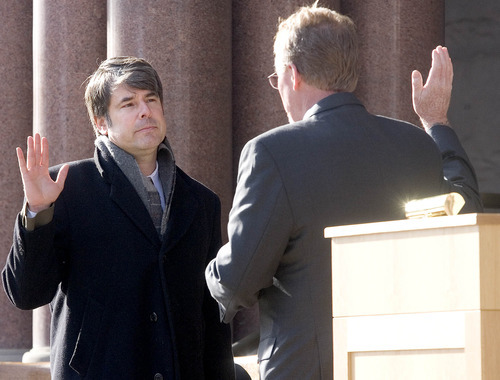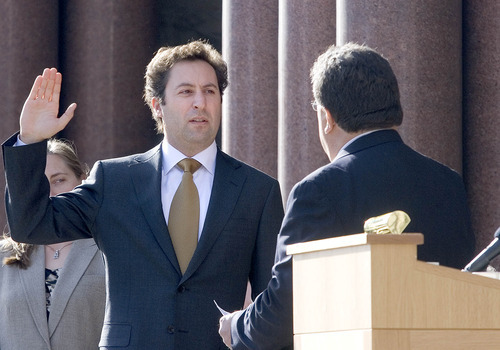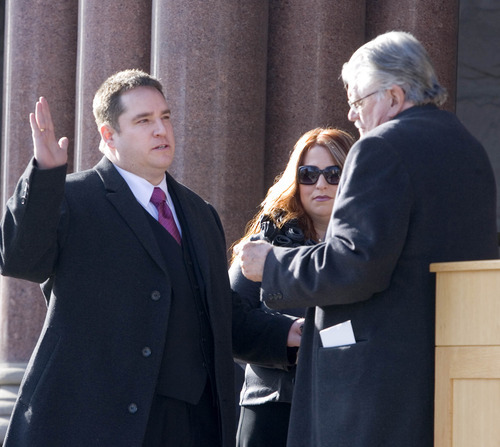This is an archived article that was published on sltrib.com in 2012, and information in the article may be outdated. It is provided only for personal research purposes and may not be reprinted.
Salt Lake City's recently re-elected mayor renewed his pledge to make Utah's capital a "Great American City," Ogden got a new chief executive for the first time in 12 years, and Provo saw its female-majority Municipal Council give way to a governing body with just one woman.
The civic shuffle took place Tuesday as cities across the state swore in new municipal leaders.
In Utah's biggest city, Mayor Ralph Becker launched his second term with a vow to foster accessibility, environmental responsibility and sophistication.
He was joined on Salt Lake City Hall's sun-soaked steps by a troika of City Council members: newcomers Kyle LaMalfa and Charlie Luke, who knocked off incumbents in November, and Luke Garrott, who took his oath for a second term.
Becker spoke of a mirror as a metaphor to take stock of the city's reflection and reputation — insisting Utah's capital wins "best in class." Becker said Salt Lake City, with its "ascendant urbanism," is emerging as a model through its growing diversity, welcoming spirit and bold ingenuity.
"We combine a city life rich in tradition and culture with an outdoor aesthetic that bears equally rich offerings," the mayor said. "No place — no urban place — has the opportunity to maintain a mountain, desert and an intensely dynamic and creative human experience quite like Salt Lake City."
A decadelong state lawmaker first drawn to Utah by its mountains and rivers, Becker cruised to a second term two months ago by besting political unknown J. Allen Kimball.
During his first term, the mayor focused on extending bicycle lanes, fast-tracking the Sugar House streetcar, adding gay-rights provisions, loosening urban-agriculture restrictions and planning a touring Broadway theater on Main Street.
Even-tempered and calm, Becker largely avoided controversy, outside of the mega-playhouse, a west-side soccer complex, and his abandoned plan to place the $125 million public safety headquarters on Library Square.
The mayor, accompanied for the swearing-in by girlfriend Kate Kopischke, called on residents to get involved.
"Imagine what our city can become," he said. "Ask yourselves how you can contribute, how you can become engaged and how you might invest in our city's future."
LaMalfa, who eclipsed three-term District 2 incumbent Van Turner, said the council must be more than stewards of city services and "hardware." It must, he added, create opportunity.
"Partnership is the robust, affordable and right way forward," he said.
He also challenged fellow west-siders to engage, urged the city to be a better friend to schools and called on his district to stop being jealous of east-side amenities.
"The west side has vastly greater potential," LaMalfa added, calling it a center for culture and community.
LaMalfa, who founded the People's Market at Jordan Park, is an unabashed progressive who has promised to push community building and a more active legislative agenda.
In the east bench's District 6, Luke brings a decade of political savvy and consulting smarts to the council. He, too, wants to see more legislative action.
After toppling the sometimes-fiery incumbent J.T. Martin in a bitter showdown, Luke said his fixation on nuts-and-bolts issues "wasn't just a campaign message," pointing to crumbling streets, neglected gutters and forsaken lights.
"This isn't sustainable, and it's not progressive," he said. "We need to do better."
Luke also vowed to build coalitions and help to develop the city's strategy regarding the Utah Legislature. "Salt Lake City should not be viewed, nor should it act, like it's an island in the state."
Garrott, representing District 4's downtown and central city, bemoaned the "toxic fuel of factionalism" afflicting national politics and called for a "politics of love," reminding onlookers that "there is an essential we" in the way City Hall operates.
"Despite this age of corruption and cynicism, there are believers in democracy," he said. "To you, I bow."
In Ogden, new Mayor Mike Caldwell was sworn in along with new council member Richard Hyer, and re-elected members Caitlin Gochnour and Amy Wicks.
Caldwell, 40, has had a long tenure within local government, serving as manager of the county's ice sheet facility and administrator of the $3 million annual Recreation, Arts, Museums and Parks (RAMP) fund.
Ogden's top job was available because former Mayor Matthew Godfrey did not seek a fourth term.
Hyer ran for a spot vacated on the council by Brandon Stephenson, who lost to Caldwell for the mayor's seat. Hyer also has deep connections with Ogden's government: He served on its Planning Commission for more than 15 years.
"It just feels like we have a positive momentum going on in the city," Gochnour said after the swearing-in. "I think we're all optimistic for some good collaboration."
In Provo, the Municipal Council took on a decidedly different look.
The arrival of four newly elected members — Gary Garrett, Gary Winterton, Hal Miller and Kay Van Buren — left Laura Cabanilla as the lone woman on a council that had boasted a female majority for eight years.
Winterton, Miller and Van Buren took seats previously occupied by Cynthia Dayton, Midge Johnson and Sherrie Hall Everett, respectively.
Garrett, who was appointed in November to fill the remainder of resigning Councilman Steve Turley's term, began his own council term Tuesday.
"My anxiety and fear have given way to excitement at this opportunity," Garrett said.
"I am ready for this adventure to begin," Winterton said.
djensen@sltrib.com Anne Wilson and Donald W. Meyers contributed to this story.


